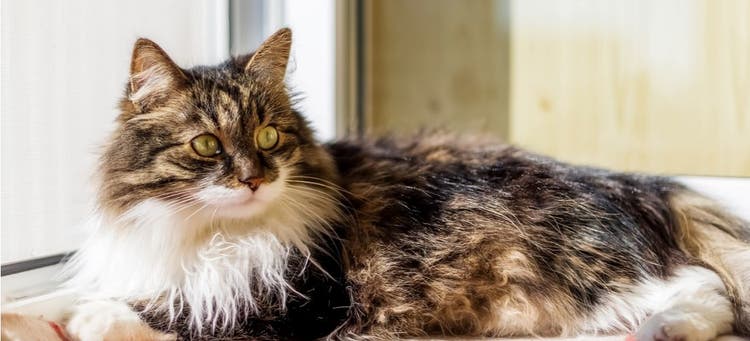
Dysphagia (Difficulty Swallowing) in Cats
Feline Dysphagia (Difficulty Swallowing)
Dysphagia is the medical term used to describe difficulty in swallowing. Dysphagia has many different causes, some of which are treatable and some are not. Diagnosing and treating the problem early can help increase the chances of a positive outcome.
Dysphagia may be a mild problem in some animals, or it may cause extreme distress in some patients. With longstanding dysphagia, a cat may lose a lot of weight due to their inability to eat and swallow (despite a normal appetite). Dysphagia may represent a transient local problem, or a severe, systemic illness. The recognition of dysphagia in your cat warrants an immediate examination by your veterinarian to determine the cause and institute appropriate therapy.
General Causes of Difficulty Swallowing in Cats
- Disorders of the nerves of the head (cranial nerves), especially diseases of the tongue (hypoglossal nerve) or chewing muscles (trigeminal nerve)
- Trauma to the jaw, tongue, and other structures of the mouth
- Inflammation of the tongue (glossitis), gums (gingivitis), mouth (stomatitis), or pharynx (pharyngitis)
- Dental diseases
- Foreign bodies, masses, or cysts in the mouth or pharynx
- Airway diseases that affect the back of the mouth and throat
- Cricopharyngeal achalasia, which is an incoordination in the movement of food stuffs from the back of the mouth through the pharynx and into the esophagus
- Paralysis of the chewing muscles from rabies, botulism, or other toxins (this condition is rare)
Symptoms of Dysphagia
- Drooling, sometimes with blood in the saliva
- Gagging
- Dropping food from the mouth or the collection of food along one side of the mouth
- Repeated attempts at swallowing
- Chewing gum motions of the mouth
- Coughing
- Regurgitation of food
- Change in appetite
- Weight loss
- Pain around the head, mouth, and/or neck area
- Physical deformities of the head and neck
- Possible nasal discharge
- Possible foul odor from the mouth
- Signs of muscle weakness elsewhere in the body
Diagnostic Tests for Dysphagia in Cats
A thorough examination is very important, as some causes of dysphagia may be detectable through examination. Your veterinarian may also recommend the following tests:
- A complete oral examination under sedation
- Complete blood count (CBC)
- Biochemical profile and urinalysis
- Radiographs (X-rays) of the mouth, skull (with teeth), and neck
- Chest x-rays (if the animal is coughing)
Specialized diagnostic tests may be indicated in select cases and may include:
- Ultrasound of the pharynx (throat)
- Pharyngoscopy (evaluation of the throat with an endoscope)
- Fluoroscopic barium swallow (food material filled with barium is observed being swallowed under a video x-ray machine)
- Certain hormonal assays, especially for hyperthyroidism
- Possible biopsy and cytology of any abnormal masses, cysts, or muscles
- Electrodiagnostic tests that measure muscle and nerve function
Treatment of Dysphagia in Cats
Treatment of dysphagia is variable depending upon the cause. Some animals require supportive care while their primary disease is being treated or is resolving.
Supportive care measures may include the following:
- Nutritional support is of paramount importance. A change in food consistency or the position of the patient during feeding may be recommended in some cases. A feeding tube that bypasses the mouth and throat may be indicated, such as a gastrostomy (stomach) tube. Occasionally, parenteral (intravenous) feeding may be indicated, depending on the primary disease process.
- Antibiotics may be recommended to combat or prevent bacterial infections.
Specific treatments may include the following:
- Surgical correction of any fractures of the jaw and palate, surgical repair of lacerations, and removal of any oral foreign bodies, cysts, and masses
- Removal of diseased teeth and application of specific remedies for dental disease
- Surgical correction or medical therapy of upper airway abnormalities
- Medications for certain hormonal problems
- Corticosteroids for inflammation of the tissues of the mouth
Home Care
Administer any prescribed medications and dietary recommendations as directed by your veterinarian. If your pet is not improving, and/or if additional clinical signs develop, contact your veterinarian. Animals with weakness or paralysis of the muscles or nerves to the head may take several weeks to return to normal, once appropriate therapy has been instituted. Consistent nursing care at home is very important to their recovery.